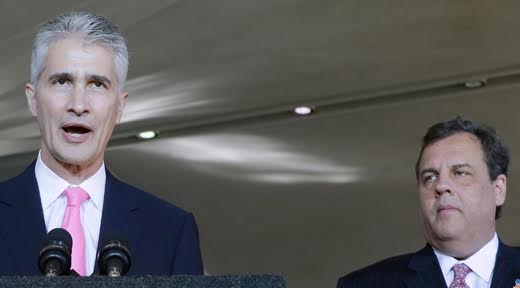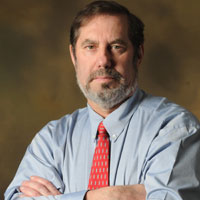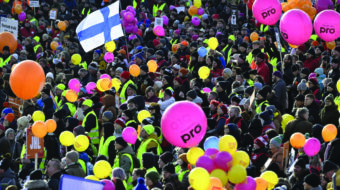
Jeff Smisek, the guy forced by scandal to resign last week as CEO of the world’s fourth-largest airline, is a major reason American workers can’t get a raise.
Smisek and his overpaid boardroom buddies nationwide have swindled American workers and American communities in a scam to amass wealth for themselves and well-heeled stockholders. They’ve extracted value from corporations and put it in their pockets and shareholders’ purses almost to the complete exclusion of investing in their corporations to create new wealth and prosperity.
CEOs like Smisek began sucking the financial lifeblood out of corporations in the 1970s. That’s when corporations stopped raising worker wages in tandem with rises in productivity and curbed research and development. Instead, corporations spent increasing portions of profit on dividends and stock buybacks.
This goosed CEO compensation while squashing worker pay. Over four decades, it has degraded corporations and produced the worst income inequality since the Great Depression.
Smisek’s failed leadership at United Airlines illustrates exactly how this CEO self-dealing scheme works to the advantage of wealthy executives and shareholders while damaging workers, communities, customers and corporations.
Under Smisek, passengers, workers and taxpayers found the skies decidedly unfriendly.
Ever since United and Continental Airlines merged, at Smisek’s urging, the corporation’s computer system has failed repeatedly, inconveniencing United customers. Months of computer glitches ensued immediately after United combined systems with Continental in 2012, and since then problems plagued fliers six times, including one in July that temporarily grounded the United fleet globally, and one last week that delayed 4,900 flights for as long as 90 minutes.
This may help explain why United ranked dead last among major domestic carriers in this year’s J.D. Power airline satisfaction survey, which measures performance in seven areas including costs, fees, in-flight service and reservations.
Customers have complained bitterly about United’s ill-treatment of fliers. And it gets low scores for arriving on time. In June, its performance was by far the worst among the largest domestic carriers. It improved slightly in July, so it was tied for last.
In addition, in five years, Smisek failed to complete combined labor agreements with two major unions, the Association of Flight Attendants representing 21,000, and the Teamsters representing 9,000 mechanics. Smisek made sure he had a personal contract with United guaranteeing him a golden parachute worth millions no matter how badly he performed. But he didn’t do anything for the workers who make sure planes and passengers are safe.
Just two months before scandal would force Smisek to resign, he announced United would buy back $3 billion in stock. Smisek took the windfall United got over the past year from dramatically lower fuel prices and used it to gin up the airline’s stock price. It rose 2 percent immediately after the buyback announcement. That was great for Smisek because the majority of his compensation was based on stock value.
It wasn’t so great for United. Or its workers. Or communities that support the airports from which United flies.
Smisek wouldn’t use a penny of that $3 billion to solve United’s problems with computers, on-time arrival, customer satisfaction or labor relations. He let those problems mount, weakening United as a corporation. He took out of the corporation billions that could have been used to fix them.
United workers denounced the move. Capt. Jay Heppner, chairman of the leadership council of the Air Line Pilots Association branch at United and a member of the United board of directors, wrote his fellow 12,500 pilots about Smisek’s lack of vision: “buying back shares of a company’s stock signals to investors that executive management cannot think of anything better to do with its excess cash.”
A truckload of United cash – $8.4 million now, and as much as $13.2 million more later – will leave the corporation with Smisek, despite his failures to resolve the airline’s problems and the fact that he remains the subject of a federal corruption investigation. A huge chunk of those payments depends on stock price – which, of course, Smisek manipulated with his $3 billion buyback.
Research by University of Massachusetts Economics Professor William Lazonick has established the relationship between worker wage stagnation since the 1970s and increased corporate expenditures on stock buybacks and dividends. Lazonick wrote about it in a paper titled “Profits Without Prosperity”:
“As a result, the very people we rely on to make investments in the productive capabilities that will increase our shared prosperity are instead devoting most of their companies’ profits to uses that will increase their own prosperity-with unsurprising results.”
Lazonick found that from 2003 to 2012, the 449 companies in the S&P index used 54 percent of their earnings to buy back their own stock and 37 percent for dividends. That left only 9 percent for investment in research, development and worker pay.
This reversed historical trends. After World War II, until the late 1970s, Lazonick’s research found, companies retained earnings and reinvested them to build corporate capabilities and worth, including decent pay raises for workers whose labor made the firms competitive. Lazonick calls this value creation. At that time, the share of U.S. income taken by the top 0.1 percent of households stood at the lowest point in the past century.
In the 1970s, corporations began allocating increasing portions of profits for stock buybacks and dividends. Lazonick calls this value extraction. CEOs withdraw value, serve themselves and leave corporate shells.
To support value extraction, many corporations also suck communities dry, demanding tax breaks, free installation of infrastructure like roads and rail spurs and tax-supported worker training. They threaten communities that don’t comply.
United made such demands of the Port Authority of New Jersey and New York. At a September, 2011, dinner in Manhattan, Smisek told the then-chairman of the Port Authority, David Samson, that United wanted help paying for a new maintenance hangar, expanded transit service from Lower Manhattan to the Newark, N.J., airport and other goodies. Samson told Smisek that he wanted United to reinstate money-losing direct flights from Newark to Columbia, S.C., where Samson had a vacation home.
Three months after Smisek and Samson dined, the Port Authority agreed to give United $10 million for the hangar. Soon afterward, United began arranging the flight to Columbia that Samson wanted, dubbed the “chairman’s flight.” Just weeks after those flights began, the Port Authority approved the expanded transit service to Newark that United wanted.
This all came to light after Samson resigned last year at the height of the Bridgegate scandal. That involved aides to Gov. Chris Christie closing Fort Lee, N.J., lanes to the Port Authority’s George Washington Bridge in 2013 in retaliation for the town’s Democratic mayor refusing to endorse Christie, a Republican. United cancelled the “chairman’s flights” almost immediately after Samson quit as authority chairman.
By then, though, Smisek’s corporation had already gotten most of what it wanted out of the government agency that is supposed to serve the public. The Port Authority paid for what Smisek wanted – although United clearly has plenty of dough to cover its own costs – at least $3 billion anyway.
The Smisek-Samson dealings are the subject of a federal corruption investigation. But what’s more corrosive to workers, communities and corporations is CEOs spending more and more on stock buybacks and dividends and investing less and less in research, development and workers.
Lazonick, director of the Center for Industrial Competitiveness, says it best: “If the United States is to achieve growth that distributes income equitably and provides stable employment, government and business leaders must take steps to bring both stock buybacks and executive pay under control. The nation’s economic health depends on it.”
Steelworkers President Leo Gerard heads one of the nation’s most politically active and largest industrial unions.
Photo: In this Nov. 14, 2013 file photo, Gov. Chris Christie, right, listen to United Airlines CEO Jeff Smisek at Newark Liberty International Airport, in Newark, N.J. Smisek, the chairman and CEO of United Airlines is stepping down in connection with an investigation into dealings with the agency that operates New York-area airports. United Continental Holdings Inc. said Sept. 8, that Jeff Smisek and two other senior executives had resigned. (AP Photo/Mel Evans, file)












Comments